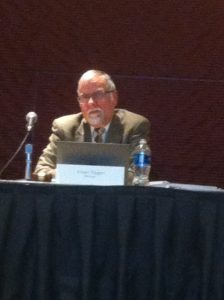
Milwaukee, Waukesha agree on landmark Lake Michigan supply deal
The mayors of Waukesha, Wisconsin and Milwaukee announced last week that the cities had reached agreement for Milwaukee to supply Lake Michigan water to its suburban neighbor.
The mayors said the deal could lead to broader cooperation between the cities.
Failure to collaborate on environmental issues has kept the two from striking a water deal in the previous decade. That is about to change the cities say.
Contaminated wells

Great Lakes Compact representatives discuss the Waukesha’s service area issue, courtesy of Gary Wilson
Waukesha’s well-water is contaminated with radium and it had to find a new source. Lake Michigan was the preferred option but Waukesha is outside the Great Lakes basin and not automatically entitled to draw from the lake.
Great Lakes governors, under authority of a regional Compact, authorized the diversion earlier this year and Waukesha had a tentative agreement with the city of Oak Creek to supply water, but it was never finalized. Milwaukee had long been interested in being Waukesha’s water supplier but differences over where the diverted water would be used prevented an early agreement.
Significant agreement
“This is the most significant intergovernmental agreement in the history of Southeastern Wisconsin,” Milwaukee Mayor Tom Barrett said in the press conference announcing the deal.

Milwaukee Mayor Tom Barrett, courtesy of Steve Glynn
“This partnership is an excellent example of regional cooperation, and it is both fiscally and environmentally sound,” Barrett said.
Emphasizing costs, Waukesha Mayor Shawn Reilly said, “after extensive analysis, we determined that a Milwaukee water supply costs significantly less than water from Oak Creek. Our responsibility is to ensure that Waukesha citizens receive the best choice for water at the lowest cost.”
Both mayors commented on the potential for future collaboration beyond water. If it comes to fruition it could mark a change in the relationship between the cities who have separate urban and suburban demographics.
Over a decade ago when Waukesha started to search for a water source it was requesting more than its actual need in order to supply neighboring towns referred to as a “service area.”
Groups opposed to the diversion viewed the “service area” concept as an opportunity for Waukesha to eventually expand its borders leading to suburban sprawl designed to become a regional entity that could rival Milwaukee.
Waukesha denied that expansion was the motivator and said it was obligated to supply the service area by a regional authority.
Milwaukee Mayor Barrett, a staunch supporter of the Great Lakes Compact that regulates diversions, balked at Waukesha’s request saying it didn’t comply with the Compact. He stood on principle and that took Milwaukee out of contention as the water supplier.

Grant Trigger, courtesy of Gary Wilson
Great Lakes governors sided with Barrett’s position and approved the diversion contingent on elimination of the service area and Waukesha accepted the decision.
Grant Trigger was Michigan’s representative for Gov. Rick Snyder and he told Great Lakes Now that supplying the service area was a “non-starter and without that issue being resolved no other issues would have been necessary to consider.”
This gave Milwaukee another opportunity to strike a deal.
Doubts on cooperation remain
But some speculate expansion and sprawl may still be a Waukesha’s priority.
“The deal will not limit sprawl in Waukesha County, as the shallow aquifer is still available to assist developers,” according to James Rowen, who opposed diverting Lake Michigan water to Waukesha.
Rowen is a former Milwaukee reporter and Mayoral Chief of Staff who writes a prominent daily blog on Wisconsin environment and politics.
And Rowen isn’t convinced that the water agreement will lead to regional cooperation touted by the mayors.
“It’s too soon to say if this is the beginning of greater linkages between the City of Milwaukee and Waukesha governments. The lack of transit and access to work sites and affordable housing remains systemic between the two counties, and regionally,” Rowen told Great Lakes Now.
Regional water consultant Lynn Broaddus thinks Milwaukee was the best source to supply Waukesha and says there can be social benefits for Milwaukee. She points to a portion of the revenue Milwaukee receives that will be dedicated to replace lateral lead pipe service lines that connect to homes as an example.
But Broaddus raises the question of who will get jobs to build the pipeline.
“It would be logical to expect Milwaukee to insist on a fair number of those jobs going to Milwaukee people. Normally those are very white, very suburban contractors and employees,” Broaddus told Great Lakes Now.
There was no mention of pipeline jobs by the two cities in the announcement.
Waukesha’s Water Utility Manager Dan Duchniak told Great Lakes Now that the “agreement certainly demonstrates the benefits of regional cooperation.”

Dan Duchniak, Manager Waukesha Water Utility, courtesy of Gary Wilson
“We hope that it may also lead to other forms of cooperation, but there are no specific topics that are being discussed at this time,” Duchniak said.
Great Lakes Now asked Milwaukee Mayor Barrett’s office about regional transit and other opportunities to connect the urban and suburban communities. Barrett’s office did not respond.
The agreement is expected to save Waukesha $40 million compared to the original deal with Oak Creek and it requires approval from the respective city councils. If approved, construction of the pipeline will begin in 2019 and take three years to complete.
The governors’ approval to divert Great Lakes water to Waukesha is the first under the Great Lakes Compact and is expected to be precedent setting for future requests.




